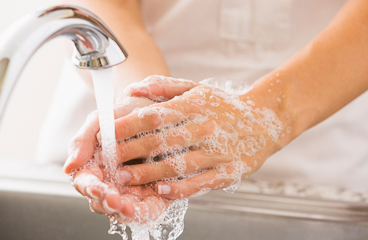
Overview
Clostridioides difficile (C. diff) is a type of bacteria that can infect the large intestine, or colon. This can cause the colon to swell and get inflamed. When this happens, it's called C. diff colitis.
This type of colitis can cause diarrhea and belly cramps. It can also cause a fever.
The infection is most common in people who are taking antibiotics while in the hospital.
If this type of colitis gets serious, it can cause the colon to get much bigger than normal. This is called toxic megacolon. It's an emergency that needs to be treated right away. Signs of this problem include a swollen belly that hurts. They also include a fast heartbeat and a fever.
Follow-up care is a key part of your treatment and safety. Be sure to make and go to all appointments, and call your doctor if you are having problems. It's also a good idea to know your test results and keep a list of the medicines you take.
How can you care for yourself at home?
- Your doctor may give you antibiotics to treat Clostridioides difficile (C. diff) colitis. If your doctor prescribes an antibiotic, you will be given a different antibiotic than the one that caused your infection. Take your antibiotics as directed. Do not stop taking them just because you feel better. You need to take the full course of antibiotics.
- To prevent dehydration, drink plenty of fluids. Choose water and other clear liquids until you feel better. If you have kidney, heart, or liver disease and have to limit fluids, talk with your doctor before you increase the amount of fluids you drink.
- Eat small amounts of food when you feel like eating. This will help you to get enough nutrition.
- To prevent the spread of C. diff, practice good hygiene. Keep your hands clean by washing them well and often with soap and clean, running water. This is most important after you use the bathroom and before you make and eat food.
- After the diarrhea is better, you are much less likely to spread C. diff. But you still need to take extra care to keep your home clean.
- Clean bathroom surfaces with a bleach solution to kill any C. diff spores. To dilute household bleach, follow the directions on the label.
When should you call for help?
Call 911 if:
- You passed out (lost consciousness).
Call your doctor now or seek immediate medical care if:
- You have a fever over 101°F or shaking chills.
- You feel lightheaded or have a fast heart rate.
- You pass stools that are almost always bloody.
- You have signs of needing more fluids. You have sunken eyes, a dry mouth, and pass only a little urine.
- You have severe belly pain with or without bloating.
- You have severe vomiting and cannot keep down liquids.
- You are not passing any stools or gas.
Watch closely for changes in your health, and be sure to contact your doctor if:
- You do not get better as expected.
Where can you learn more?
Go to http://www.healthwise.net/patientEd
Enter H511 in the search box to learn more about "Clostridioides Difficile (C. diff) Colitis: Care Instructions".
Current as of: September 30, 2025
Author: Ignite Healthwise, LLC Staff
Clinical Review Board
All Ignite Healthwise, LLC education is reviewed by a team that includes physicians, nurses, advanced practitioners, registered dieticians, and other healthcare professionals.

